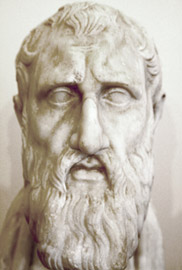The staple diet of public speakers
 The
battle of wits and oratory has subsided and an unusual calm prevails in
the country after the campaign for the Presidential Election. Those who
had listened to the speakers on political platforms and over television
are now weighing the pros and cons of their arguments. Whatever the
outcome, the speeches remind us of two Zenos known to philosophy. They
are Zeno of Elea (c.490-430 BCE) and Zeno of Citium (490 BC - ?). The
battle of wits and oratory has subsided and an unusual calm prevails in
the country after the campaign for the Presidential Election. Those who
had listened to the speakers on political platforms and over television
are now weighing the pros and cons of their arguments. Whatever the
outcome, the speeches remind us of two Zenos known to philosophy. They
are Zeno of Elea (c.490-430 BCE) and Zeno of Citium (490 BC - ?).
We know very little about Zeno of Elea except his paradoxes of
motion. It is said that he produced 40 paradoxes out of which only a few
remain today. He produced such paradoxes mainly to defend his teacher
Parmenides who said that the changing and varied world we perceive
around us is not reality. According to him, reality is something
motionless, uniform and simple.
Parmenides (c.515-445 BCE) said, “All is one.” What he meant was that
everything that is real must be eternal and unchanging and must have an
indivisible unity. Through this process he shows that our perception of
the world is faulty and full of contradictions. During the recently
concluded Presidential election campaign, some people desired a change
and others wished to retain the status quo. However, according to
Parmenides, change is something impossible to achieve.
Logical technique
Through his logical technique of reductio ad absurdum (literally,
reduction to absurdity) Zeno tried to show that his opponents’ view to
be false because it leads to contradictions. Through a series of
paradoxes he tried to prove that the common sense notion of change and
plurality are illusory and they cannot represent the true nature of the
world.
|

Zeno of Elea (c.490-430 BCE) |
Zeno was at pains to show that there cannot be many different things
in the world. He said that any three dimensional object can be divided
into many parts. Even the smallest part can be further divided until you
get down to the very basis of substance. Modern science has shown that
even atoms can be split into neutrons and protons. It logically follows
that any physical entity can be divided into half that magnitude.
Zeno also had an argument against the idea of motion. In one of his
well-known paradoxes, known as “Achilles and the Tortoise”, he wants us
to imagine Achilles giving the tortoise a headstart. But before he can
get to where the tortoise is, it will have moved a little further on.
This process will continue ad infinitum and Achilles would never catch
the tortoise no matter how fast he runs! Later philosophers such as
Immanuel Kant, David Hume and Friedrich Hegel offered many solutions to
Zeno’s paradoxes. But they were not very convincing.
Absurdity
Modern speakers have something to learn from Zeno’s method of
argument. He is credited with perfecting a way of revealing an idea’s
absurdity by showing that accepting it leads to a logical conclusion.
The well-known political analyst, Dr Dayan Jayatilleke seems to have
perfected this way of arguing a point. Secondly, such an argument leads
to a logical conclusion that is somehow obviously ridiculous because it
offends either our reason or common sense.
Let’s look at another popular paradox known as “The Flying Arrow.”
Zeno begins from the premise that everything which occupies a space
equal to itself either is in motion or is at rest, that nothing is moved
in an instant, and that the mobile always occupies in each instant a
space equal to itself, seems to adjust itself in this way.
“The flying arrow occupies a place equal to itself and thus for the
whole time of its motion. But what occupies in an instant a place equal
to itself does not move because nothing is moved in an instant. Hence,
the flying arrow, as long as it is in motion, does not move for the
whole time of its flight.”
Mockery
Most public speakers on political platforms and other fora make a
mockery of themselves when arguing for or against an issue. Shouting,
cracking jokes, gesticulating and mud-slinging may satisfy the lower
instincts of the audience. However, such practices will not appeal to
intelligent listeners. Logic, philosophy and psychology should be the
staple diet of public speakers and others who wish to mould public
opinion.
The power of persuasion does not come to a speaker at birth, He has
to learn the art of speaking to win friends, show the falsity of his
opponent’s argument and to drive home a point powerfully. Even writers
have to cultivate the art of persuasion which take long years to learn. |

